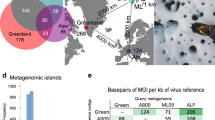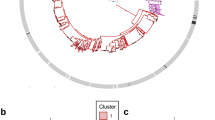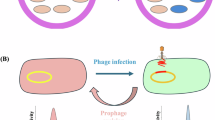Abstract
The remarkable diversity of genes within the pool of prokaryotic genomes belonging to the same species or pan-genome is difficult to reconcile with the widely accepted paradigm which asserts that periodic selection within bacterial populations would regularly purge genomic diversity by clonal replacement. Recent evidence from metagenomics indicates that even within a single sample a large diversity of genomes can be present for a single species. We have found that much of the differential gene content affects regions that are potential phage recognition targets. We therefore propose the operation of Constant-Diversity dynamics in which the diversity of prokaryotic populations is preserved by phage predation. We provide supporting evidence for this model from metagenomics, mathematical analysis and computer simulations. Periodic selection and phage predation dynamics are not mutually exclusive; we compare their predictions to indicate under which ecological circumstances each dynamics could predominate.
Similar content being viewed by others
Article PDF
Author information
Authors and Affiliations
Corresponding author
Rights and permissions
About this article
Cite this article
Rodriguez-Valera, F., Martín-Cuadrado, AB., Rodriguez-Brito, B. et al. Explaining microbial population genomics through phage predation. Nat Prec (2009). https://doi.org/10.1038/npre.2009.3489.1
Received:
Accepted:
Published:
DOI: https://doi.org/10.1038/npre.2009.3489.1



